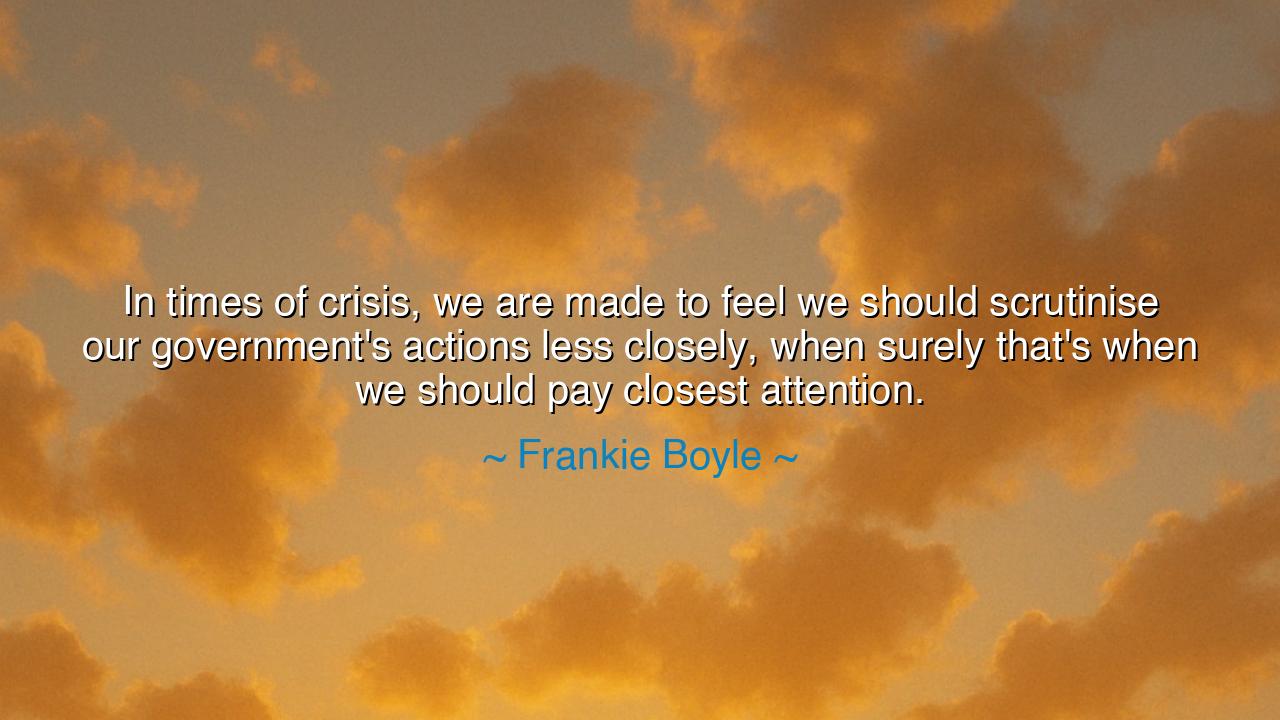
In times of crisis, we are made to feel we should scrutinise our
In times of crisis, we are made to feel we should scrutinise our government's actions less closely, when surely that's when we should pay closest attention.






“In times of crisis, we are made to feel we should scrutinise our government's actions less closely, when surely that's when we should pay closest attention.” Thus spoke Frankie Boyle, a voice sharp with wit yet heavy with truth, echoing the ancient warning that freedom perishes not by thunder, but by quiet surrender. His words pierce the veil of comfort that often shrouds a people in times of fear. For when danger rises — be it war, disease, or unrest — the heart of the nation turns to its leaders in search of safety. And in that turning, there lies a great peril: the temptation to close our eyes and let power move unchecked. Boyle’s cry is therefore both a rebuke and a call — a summons to vigilance when the world trembles most.
The origin of this truth lies deep within the story of humankind. For whenever men and women have faced calamity, rulers have risen who promised security in exchange for silence. It is an old bargain, written again and again in the annals of history. The people, weary of uncertainty, seek to be led — and so they trust without questioning, obey without watching, and surrender the very liberty they seek to preserve. Boyle reminds us that crisis is the moment when freedom is most fragile, and that to question authority in such times is not betrayal, but duty. For power, like fire, is a good servant but a terrible master, and it is in the darkness of fear that its flame burns most fiercely.
Look, then, upon the story of the Roman Republic, when the Senate, in its hour of fear, appointed Julius Caesar as dictator to save the state. They thought it a temporary measure, a brief surrender for the sake of survival. But once granted, power did not retreat. The republic that had endured for centuries fell not to an enemy’s sword, but to its own complacency. The people, longing for stability, accepted the rule of one man — and in doing so, lost the freedom of all. So it is, from Rome to our own day: every emergency gives birth to rulers who promise safety, and every generation must decide whether to trade its watchfulness for ease.
In modern times, this truth has returned with haunting clarity. After the tragedy of September 11, 2001, nations across the world expanded surveillance, secrecy, and control, all in the name of protection. Many citizens, driven by fear, welcomed these powers without question. Only later did some awaken to realize that in defending liberty, they had allowed it to shrink. Frankie Boyle’s words are the echo of that awakening — a reminder that the scrutiny of government is not disloyalty, but the highest form of patriotism. To watch one’s leaders, to question their motives, to demand truth — these are the duties of a free people, not the crimes of rebels.
In times of calm, vigilance is easy; in times of chaos, it is holy. When the drums of crisis beat and the banners of fear are raised, the crowd cries for unity, and those who question are branded as traitors. Yet it is then, precisely then, that the true guardian of freedom must rise — not with rage, but with reason; not to destroy, but to hold power accountable. For the test of a democracy is not how it acts in peace, but how it behaves in peril. The eyes that stay open in the storm are the eyes that keep the nation from losing itself.
Boyle’s insight cuts to the soul of governance: that authority grows bold when the people grow quiet. To scrutinize one’s rulers is not to oppose them, but to remind them of their place — as servants of the people, not masters of fate. When governments act in shadow, secrecy multiplies, and corruption takes root. Transparency, even in crisis, is the light that keeps tyranny at bay. It is not cruelty that builds tyrants, but apathy — the silence of the many when the few take control. Thus, the vigilance of the citizen is not mere suspicion; it is the lifeblood of freedom itself.
Let this be the lesson for all generations: question even those you trust, especially when you are afraid. For fear clouds judgment, and fear is the gate through which oppression enters. In moments of danger, do not lay down your rights for the promise of safety — for rights once surrendered are seldom returned. Speak, inquire, and hold power to account, even when it is unpopular to do so. The loyal citizen is not the one who obeys blindly, but the one who dares to see clearly.
So remember, O listener, in every hour of crisis: do not close your eyes when the storm begins. Look deeper, ask harder, and guard your freedom with thought as others guard it with arms. For the cost of liberty is not comfort, but constant watchfulness. And when the world trembles and the rulers speak of unity and fear, let your heart be steadfast — for it is not disobedience to question; it is the truest act of love for your country.






AAdministratorAdministrator
Welcome, honored guests. Please leave a comment, we will respond soon